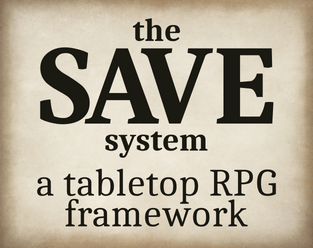Each player who will portray a hero starts by choosing their hero’s role. The game provides a list of these roles, which are templates or archetypes appropriate to the genre. Roles for a high fantasy game might include warrior, mage, and priest; roles for a game about high school drama might include jock, nerd, and loner. Between six and eight roles is a good number.
Your role dictates which actions your hero prefers. An action is an activity that heroes will perform frequently, and provides the opportunity for risk and consequences. Each game will have its own list of genre-appropriate actions, each expressed as a verb with a few accompanying explanatory words. A high fantasy game’s actions might be:
- AVOID detection or peril
- BATTLE a worthy foe
- EXPLORE a mysterious place
- FOCUS your will and spirit
- REVEAL obscure information
- SURVIVE in wastes or wilderness
A typical game will provide a list of six actions, and each role will prefer two of those actions.
Your role also provides your expertise. In a high fantasy game, a warrior’s expertise might be weapons and tactics, whereas a mage’s expertise might be occult knowledge. An expertise should apply to more than one action; for example, a fighter’s expertise in weapons and tactics might help them AVOID a military patrol, or BATTLE an invading army, or REVEAL the history of a legendary axe.
Each role will give a few questions to help you determine your history. Answering these questions connects your hero to the world and to the other heroes. The history questions for a high fantasy priest might be:
- What compelled you to join the priesthood?
- How did your faith save you from a terrible fate?
- Which hero do you hope to bring faith to?
Each role provides a choice of pursuits to start the game with. A pursuit is an unresolved issue that’s important to your character. You’ll choose one of the listed pursuits and answer an attached question that connects the pursuit to another hero. Establish further details as you play. A mage might choose from the following pursuits:
- What ancient artifact do you seek? Which of the heroes saw it once?
- What’s the name of the cult of wizard-hunters that’s on your trail? Which of the heroes has a past connection with the wizard-hunters?
- What horrible sorcerous mistake of yours will you make right? Which of the heroes suffered for your misdeed?
A role might provide other character-building prompts as well, like a list of useful equipment to choose from, or a list of nations that might be your homeland, or a list of social cliques you might be part of. All of a role’s choices and prompts should establish information about the heroes, their history, their relationships to each other, and the world they live in.
You can make the game appropriate for larger or smaller player groups by adjusting the number of roles and actions in the game. If your game has eight roles, six actions, and two preferred actions per role, a group of three to five heroes will have plenty of roles to choose from, and it’s likely that at least one of the group's heroes will prefer each action. With too few actions or roles, your heroes won’t have unique strengths. With not enough preferred actions per role, a group of heroes might be deficient in several actions, leaving them poorly prepared for many situations.


